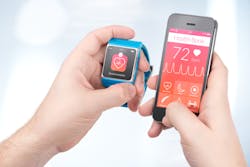While there is rapid growth in the use of digital health tools, such as activity trackers, smart watches and health apps, nearly half of consumers (46 percent) say their physician is not incorporating self-collected health data in guiding their healthcare, according to a HealthMine survey.
HealthMine surveyed 500 people who use digital health tools for a report titled “HealthMine Digital Health Report: The State and Impact of Digital Health Tools.”
According to an earlier Accenture report, the use of digital health tools in primary care could save the U.S. healthcare system $10 billion annually. And, there are now 165,000 health-related apps that run on Apple’s iOS and Google’s Android.
And, as reported by Healthcare Informatics Editor-in-Chief Mark Hagland, a new report from PwC (PriceWaterhouseCoopers) indicates that 45 percent of consumers own a fitness band, 27 percent own a smart watch, 14 percent own a smart video or photo device and 12 percent own smart clothing.
According to the HealthMine survey, the most popular digital health tools today are fitness and exercise apps (50 percent), food/nutrition apps (46 percent) and weight loss apps (39 percent). Disease management, smoking cessation and telemedicine have the lowest adoption of all digital health tools. And, the survey found that digital health users are engaged with their digital health tools. Fifty-nine percent (59 percent) use their digital health devices/apps at least once per day.
The survey found that a significant amount of digital health data is not reaching doctors or health plans and that there is a disconnect between where consumers would like their self-collected health data to go and how easy it is to share it.
Three quarters of consumers who use mobile/internet-connected health applications are willing to share the data they collect with their doctor/healthcare provider, but only 32 percent say that this data sharing happens automatically. Forty-two percent of consumers say the digital health they collect goes nowhere.
In Hagland’s article about the PwC report on wearables, he interviewed Vaughn Kauffman, a global practice leader in PwC’s Health Industries Advisory, about the findings. Kauffman indicated that physicians have some apprehension around taking in data from mHealth devices and wearables.
“Some providers are further down the road than others around utilizing these kinds of data for engagement. There’s the potential to extend the doctor-patient relationship to beyond the direct doctor visit interaction. And obviously, this would involve individuals opting in, as opposed to kind of a Big Brother phenomenon,” Kauffman said in the article.
In the HealthMine survey, 52 percent of respondents were enrolled in a wellness program. Sixty percent (60 percent) of wellness program participants report that their wellness program connects the data from their digital health tools to the rest of their health information (medical record, pharmacy information and insurance benefits).
What’s more, 60 percent of consumers who use digital health tools say they have an electronic health record. But most are accessing their health record to simply “stay informed.” Only 22 percent using digital health are accessing EHRs to help make medical decisions.
The survey also looked at trends related to telemedicine. More than one-third (39 percent) of digital health users have not heard of telemedicine. In addition, only one third of respondents say their health plan offers telehealth as an option. Fifty-five percent of respondents who have access to telemedicine have used it. And, the vast majority (93 percent) of those who have used telemedicine say it has lowered their healthcare costs.
When polled as to why they had not used telemedicine, 42 percent of respondents said they prefer a doctor office visit. But, more than a quarter of consumers also reported that they did not know when it is appropriate to use telemedicine versus traditional medicine.
Overall, the consumers surveyed believe that the digital health tools they use are working—76 percent say their health devices/apps have made them healthier. And, 57 percent report that using digital health tools has helped to lower their healthcare costs. And, the majority (88 percent) plan to use more apps/devices in the near future, with stress apps and smart scales in the highest demand.
Despite the growth in health app and device usage, some consumers need more engagement and/or education to reap the benefits of these tools, the report authors stated. For those who are using digital health but not seeing the advantages, low usage is the number one reason, followed by a lack of understanding of what to do next/differently, the survey found.
And, the survey results indicate that consumers who may digital health tools the most may be underutilizing them. Fifty-nine percent of respondents suffer from at least one chronic condition, but very few, only 7 percent, are using a disease management tool, while half use a fitness/activity tracker device or app.
“These tools are still in the early phases of adoption, used primarily for lifestyle and fitness management rather than for controlling chronic disease. As health devices and applications mature, and consumers become more educated about their options, digital health can have greater impact on individual health improvement,” the report authors wrote.


